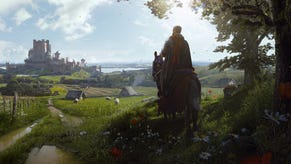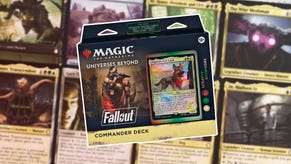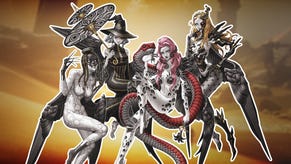RETRO VGS, the Flip Side of the Quest for Classic Game Fidelity
While some wrestle to make old games work on modern equipment, this upcoming console strives to make modern games work like old equipment.
This article first appeared on USgamer, a partner publication of VG247. Some content, such as this article, has been migrated to VG247 for posterity after USgamer's closure - but it has not been edited or further vetted by the VG247 team.
My recent obsession with coaxing the best possible experience from classic game consoles on modern TV equipment has been coming along over the past month or so; I've recently added a small Sony PVM display to my setup to allow me to play Zapper and R.O.B. games on my NES. (Just kidding, no one should ever want to play R.O.B. games.)
There was one final facet of the "retro game fidelity" crusade I intended to cover in my piece last month, though the timing didn't quite work out: The RETRO VGS (Video Game System), a new console slated to enter a crowdfunding phase sometime next month. Heading up the VGS project is Mike Kennedy, the founder of classic game auction site GameGavel and — as the system's name would suggest — RETRO Magazine. (Disclosure: I contribute a regular column to RETRO magazine, but I have had zero involvement with the RETRO VGS and have no stake in its success.)
The VGS represents the flip side of the retro-authenticity coin: Where most enthusiasts spend time constructing elaborate setups of modded consoles, upscalers, and bulky CRTs in order to play classic games on original hardware in the modern living room, the VGS instead exists (or will, once it launches) to bring the physical living room experience to contemporary games inspired by the classics. Kennedy's ambition is to round up publishing rights to a number of retro-style indie games and classics alike in order to produce them as cartridges that run on the VGS. Currently, the launch lineup includes well-known indies Pier Solar and Read Only Memories as well as Super 3-D Noah's Ark, an unlicensed Super NES game that used the DOOM engine (reputedly with id's mischievous blessing) for a Bible-themed shooter.
In other words, the idea is to give physical form to games that previously have existed only as digital releases and bring them all together on a single system. The VGS itself is every bit as unusual as its mission statement: It looks for all the world like an Atari Jaguar — because it is, at least on the outside. Inside, however, it will run on a field-programmable gate array chip that can be reconfigured "on the fly" to emulate any number of systems and processors, giving the VGS potential to bring together games from countless forgotten classic consoles... assuming licensing works out, of course.
It's probably the most ambitious retro console concept I've ever heard of; certainly it seems to aim much higher than the usual clone consoles and Droid-based emulator systems that are practically inescapable these days. It's an attempt to create a new platform altogether, essentially. Yet the scope of RETRO's aspirations (and the seeming counter-intuitiveness of taking digital-only releases into physical form) raises a lot of questions, which I directed to Kennedy.
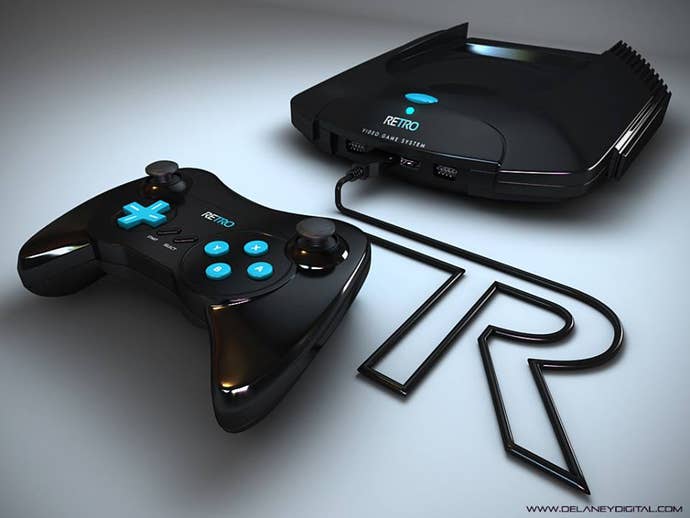
USgamer: What was the genesis of the VGS concept?
Mike Kennedy: Back in 2012 Steve Woita (Ex-Atari, Apple, Sega, Tengen) and I started discussing the creation of a new cartridge based console to play new games. Originally, we were considering some sort of plug-n-play classic controller that would accept SD card media, new games. But the timing was never right. That was until I was walking the floor at E3 2013 and was amazed by all the indie games being shown off in the booths of Microsoft and Sony. Now that retro/classic inspired and looking games were being taken seriously by Microsoft, Sony and Nintendo I thought now the time is right – and also largely because retro videogame aesthetics are now fast becoming a timeless art form.
That was when I began considering using the Atari Jaguar shell and cartridge tooling that was in the possession of Imagin Systems Corporation. They had purchased the tooling from Atari back in 1998 and had repurposed it as a dental camera. I called Steve Mortensen (President of Imagin Systems) and asked if he still had the molds for sale. After a confirmation, I was on my way up to San Carlos, CA (December 2014) to see them with my own eyes and make him an offer. In the end, I purchased the tooling and had it shipped from San Carlos down to a large injection mold company in Southern California so they are closer to home. The purchasing of the Atari Jaguar tooling was necessary for me to take on such a significant venture. In the end it will have saved us nearly $500M in start-up costs. Of course, RETRO VGS will have entirely new system design and architecture, as well as new classically inspired USB controllers.
USG: There's a lot of overhead involved in fabrication, warehousing, and shipping physical media. But alas, video game fans are a lot of cheapskates. That seems like a significant obstacle to deal with.
Mike Kennedy: We know RETRO VGS won't be for every gamer. We are targeting a market of gamers who grew up on and/or still appreciate these magic things called cartridges and the culture that runs alongside cartridge gaming like the tangibility, collectability and tradability. Since we also obtained the Jaguar cartridge molds, it saved tons of money up front having to design a cartridge from scratch. The bottom line to my team is that some games are simply worth preserving. Think about it, how many great "retro" inspired games have you played over the past 4-6 years on your tablets and phones, or on Steam? How many have you forgotten about? Are there some games that you would still enjoy playing today if you had a means of playing them and even more importantly a means of remembering them?
And, gamers are cheap, but also smart and savvy when it comes to purchasing games. The game industry has sold us all a bill of good when it comes to their argument of digital games and DLC equal less expensive games. At least for console gamers this hasn't been the case. Now, for retro inspired titles that are generally cheaper than the Triple A fair, they are mostly relocated to digital downloads and are sold for significantly less money. These are the games we want to bring onto cartridges. Yes, they will cost gamers a bit more money, but they will have them to own, play and enjoy for a lifetime. Just like many of us still have the advantage of enjoying our cartridge based consoles from the '70s, '80s and '90s.
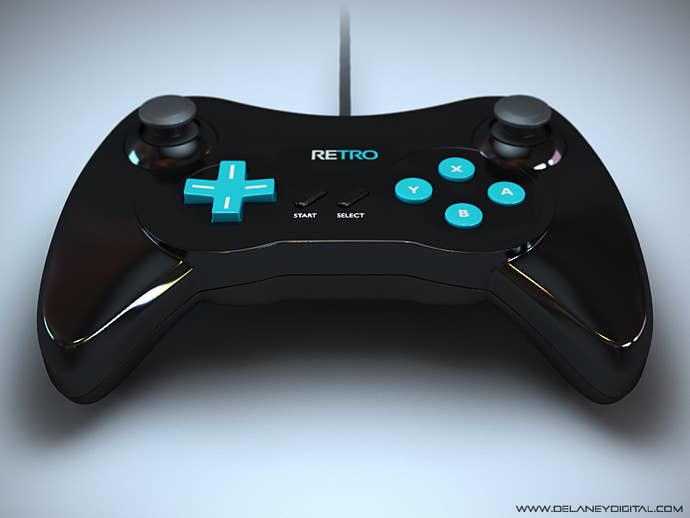
USG: A common criticism I've seen of the VGS posits that its reliance on carts amounts to fetishism for aesthetics rather than for the game experience itself, and that there's no practical need for carts for a device like this. What's your response to that line of reasoning?
Mike Kennedy: There are some important advantages of cartridges. The obvious one is little to no load times. But the biggest things cartridges bring to the table versus their digital/streaming counterparts are their physicality. The ability for gamers to once again collect their favorite games on cartridges and have the box and instruction manual to go along with them is something many gamers wish for. With RETRO VGS they will have this opportunity once again. It should also be assumed that with a cartridge based console, like RETRO VGS, it will not require internet/network connectivity or irritating system updates.
To put it very simply, we don't want RETRO VGS to have to "ping" a server years down the road that is no longer there or has been decommissioned. This would essentially brick the console and render it useless. As I said before, we want RETRO VGS to be a console to stand the test of time. Since it is retro by nature, it won't have to be upgraded and improved every ten years like all the consoles that have come before it. RETRO VGS is stuck in time and as long as there are developers who enjoy making retro style games and gamers who enjoy playing them, then RETRO VGS will be around. There is no planned obsolescence.
USG: What's to prevent the VGS from being hacked and turned into an emulation machine, or to keep the ROMs from being ripped and thrown onto Pirate Bay within a matter of hours? Piracy and emulation exist, and they're especially dangerous for boutique ventures like the VGS.
Mike Kennedy: We aren't against emulation, and with our FPGA framework, gamers will undoubtedly have RETRO VGS playing various emus and roms. What they do with the console after they purchase it is out of our hands. As far as "our" published games being ripped and thrown onto Pirate Bay, that will happen as well. Like all generations of gaming, there will be piracy on RETRO VGS. But in the end, there are gamers that will pay to own and collect the real thing and gamers that will steal it. We've talked to many long-time developers and that is just something we have to live with; although, we will be taking some measures to make it more difficult and time consuming to do so. Pricing our games smartly and competitively will also combat much of the piracy.

